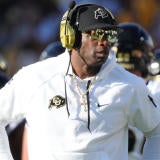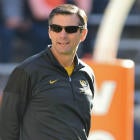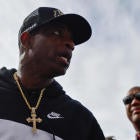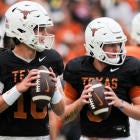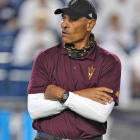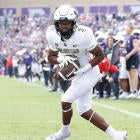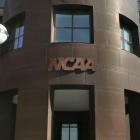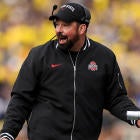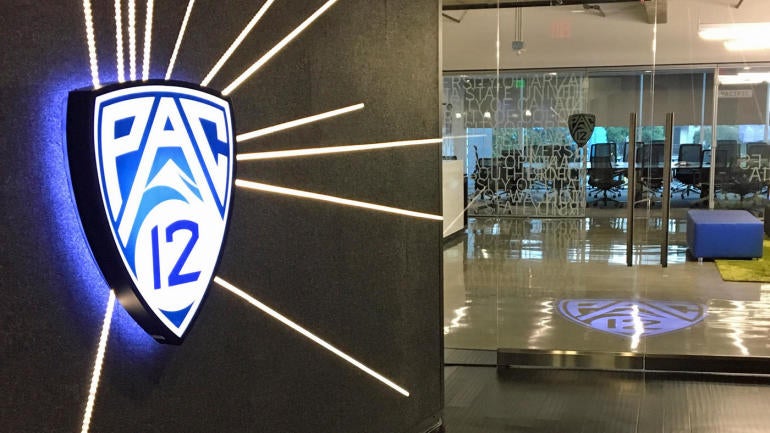
The Pac-12 has finally hired a new commissioner. Let the Las Vegas jokes flow like an early-bird dinner theater set for the geriatric crowd on The Strip.
Conference of champions, er, gamblers. Shrimp cocktail Fridays. Comped villas for high-roller faculty-athletic reps at league meetings.
With that out of the way, yes, the Pac-12 hired a high-profile Vegas big shot to run its high-minded, academic conference. Once again, the union between commissioner and conference is at least untraditional.
George Kliavkoff comes to the Pac-12 as president of entertainment and sports at MGM Resorts. In that role, he was responsible for booking more than 9,000 events at 35 venues worldwide. But he only held that job for all of 2 ½ years so. That doesn't make him your typical Vegas high roller.
Kliavkoff's undergraduate degree is from Boston University. His law degree is from Virginia. His background is working in augmented reality with a start-up. Nine years ago, he was helping launch MLB Advanced Media. His oversight of Hearst Entertainment and Syndication unit included buying a stake in the production company that developed "Shark Tank".
"Our mission at my previous job was to entertain the human race," Kliavkoff said. "I think we did a pretty good job of that. I want to focus on this new mission."
If Kliavkoff is a big-timer, it's not in the traditional Vegas Rat Pack, pinky ring sense; however, it's not necessarily in the college athletics sense, either.
That makes Kliavkoff the second consecutive untraditional candidate following Larry Scott for a league that seemingly was screaming for a traditional commissioner.
It's also fair to say Kliavkoff's hiring was generally greeted positively.
"I'm seeing it in every answer he's giving you," said Oregon president Michael Schill during Thursday's Zoom press conference. "He's incredibly thoughtful. He has great values. He knows what he knows. More importantly, he knows what he doesn't know."
That last sentence alone might be what sets Kliavkoff apart from Scott. He knows his limitations.
The new commissioner intends to go on a listening tour of the conference campuses. That is in stark contrast to Scott, who was often accused of being tone deaf, certainly not personable enough to engage the athletic directors for whom he worked.
Kliavkoff wants an expanded College Football PLayoff, a good thing to say in the championship-starved Pac-12 on the day he is hired. He was humble enough to admit that he doesn't know what the structure should look like.
Kliavkoff has never worked on campus. The Pac-12 positioned that as a plus, much like it did 11 years ago with Scott. The former head of the Women's Tennis Association turned his conference upside down with glitzy presentations and marketing initiatives. The new guy has to be smart enough to know basketball games in China don't build value. Beating Ohio State in a nonconference game does.
"Very much a new prototype for new sports commissioners," Schill said of the Kliavkoff hire. "Even without serving a day on the job, George is challenging all of us to envision what is possible for the Pac-12. Had we not hired George, we may have been competing against him."
That press-release chatter sounds familiar -- for any press release. What's unusual is Kliavkoff tackling the primary issue head on. He must fix Pac-12 football quickly, correctly and without misstep. Basically, he must develop a culture in the league that allows schools to hire the next Urban Meyer. The last time Meyer was available, no one did, which said more about the conference than the coach.
That's basically a crack at USC, maybe Washington, the two Pac-12 schools with the resources and athletic will (maybe) to pay the $8 million a year it would have taken to get Meyer. That will sound like everything that is wrong with college athletics. But it is reality. Meyer helped transform three leagues with his excellence (Mountain West, SEC, Big Ten). Only Nick Saban has more national championships among men currently walking the planet.
You know how the SEC is sometimes mocked for its slogan, "It just means more"? In the Pac-12 -- particularly in the presidential board rooms -- it doesn't. That has to change or Kliavkoff could be the next Scott.
"The Pac-12's greatest strength is its institutions and student-athletes. The value of a Pac-12 education cannot be overstated," Kliavkoff said. "The greatest weakness is the number of years it has been since we won a football or basketball national championship. We're going to do everything in our power to fix that."
For now, the main football talking points are improved recruiting; name, image and likeness opportunities; and an expanded playoff. Keeping the likes of Najee Harris, Bryce Young and D.J. Uiagalelei -- all native Southern Californians -- at home in the Pac-12 literally might have kept Kliavkoff at MGM and Scott in place. The destination cities of the West should give the Pac-12 an NIL recruiting advantage.
Kliavkoff pointed out why we're most certainly headed for at least an eight-team playoff. In sports sponsored by the NCAA, roughly one-fifth of the schools make the postseason. In the independent CFP, which operates mostly outside the NCAA's purview, it's 3%.
If it's the despair of the Pac-12 going 17 years and counting without a football national championship somehow shaming the CFP into a new era, so be it. The Pac-12's success in the NCAA Tournament restored some of the league's credibility.
"We just need chances," Kliavkoff said.
The Pac-12 needs to meet those opportunities halfway. Football hasn't played for a national championship in five years. Basketball hasn't won a title in 24 years -- or before the conference's current players were born.
The chances will be created within the only major conference West of the Rockies and a new commissioner with little experience in turning around aircraft carriers like this.
One high-ranking college administrator texted a yawning emoji upon announcement of the hire. One media wag said Kliavkoff should be "familiar with long odds."
But a flurry of Pac-12 athletic directors texted their approval when contacted by CBS Sports. That's saying something because that group was largely treated as second-class citizens by Scott.
"He is dynamite; he's a great consensus builder," said Jim Livengood, the former UNLV AD who became close to Kliavkoff in Las Vegas. "The best way to put it is, you've met a lot of people that have answers but don't have questions. He would check all the boxes you could check."
"Now," Livengood added, "it's going to be getting boulders moved."
Kliavkoff will be responsible for negotiating a new TV deal. The Pac-12 is always going to be No. 4 or No. 5 in Power Five revenue. The SEC and Big Ten will always lead the way. The idea, as it has always been, is to get as close in revenue to those two leagues as possible.
Kliavkoff seemed to indicate the Pac-12 Networks will be part of the future. The league will not be shuttering the network that has underachieved. He also left open the possibility the league could renegotiate a new media rights deal before the current one expires in 2024.
But it all starts with getting better on the field. The next-best chance may be working a few miles from the L.A. Coliseum.
Former Oklahoma coach Bob Stoops takes over for Meyer this fall as a Fox analyst in the L.A. studios. Word is Stoops is eager to get back in the game if the right job comes along.
If an opportunity opens up in the Pac-12, and if Stoops is interested, that school cannot whiff on this opportunity to take what would be the most significant step of the Kliavkoff era in turning the conference around.










